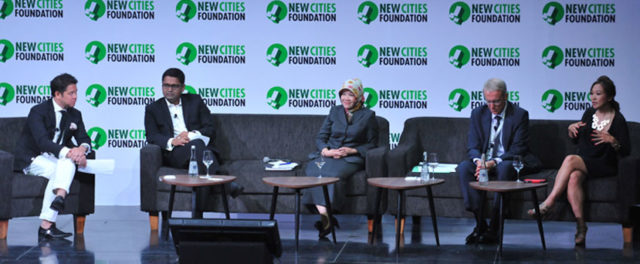Seizing the Urban Moment
July 28, 2015 — Blog
This post is part of our Seizing the Urban Moment discussion series, following the fourth edition of the New Cities Summit in Jakarta in June 2015.
The urbanization over the next 35 years is a developing country problem.
Reuben Abraham, Chief Executive Officer and Senior Fellow, IDFC Institute
During the opening panel of the New Cities Summit in Jakarta, Reuben Abraham of the IDFC Institute observed that whilst the urbanization story so far has focused on developed countries, “urbanization over the next 35 years is a developing country problem”.
While participants at the Summit understand the crucial importance of cities, that is not necessarily the case for certain leaders in developing countries, he stated. For example, in a recent talk with five heads of African countries, only one of them thought that cities were more important than rural areas – Paul Kagame of Rwanda. “We need to make the case for why cities are important,” Abraham said.
Abraham also noted that while technology is important in cities, they should not “put the cart before the horse”. Tackling crime and governance are fundamental. It should be about “doing smart things in cities, rather than smart cities”.
Michel Crochon of Schneider Electric reminded delegates that seizing the urban moment requires organizations to restructure. City governments “become very siloed,” he said, but “collaboration is a change of mindset”. All departments and agencies “need to have a shared vision” to achieve success.
Meanwhile, Peggy Liu of the Joint US China Collaboration on Clean Energy said that cities should look beyond traditional sources of advice. “We’ve learned in China that you can’t just have architects or clean energy experts looking at infrastructure”. She called upon cities to “cast a much wider net” to understand the culture and “story” of a city. “Bring in the movie people, the visual storytellers,” she said. “What does culture mean? How do we make the space vibrant, have a soul?”
Tuty Kusmarati said that Jakarta is reforming its planning processes to be less top-down and more inclusive. “We have to do smart work… for the 10 million citizens of Jakarta. We have to listen to them personally,” she said. “We are planning for bottom-up processes started from a community level.” Ideas are crowdsourced by citizens and then pass through various levels of city government.
Equally, when it comes to infrastructure projects, the city is looking for private sector partnerships to speed up processes and better serve citizens. Examples include the building of parks and the implementation of water projects in the north of the city.

Speakers
Reuben Abraham, Chief Executive Officer and Senior Fellow, IDFC Institute – @IDFCinstitute
Tuty Kusmarati, Head, Regional Development Planning Board, Jakarta
Michel Crochon, Executive Vice-President, Global Strategy & Technology Member of the Executive Committee, Schneider Electric – @SchneiderElec
Peggy Liu, Chairperson, Joint US China Collaboration on Clean Energy (JUCCCE) – @shanghaipeggy / @JUCCCE
Moderator: Jason Pomeroy, Principal and Founder, Pomeroy Studio